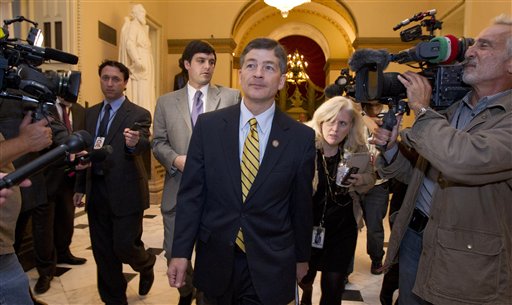Former Sen. George Mitchell made a speech Wednesday in Portland, and his remarks produced this headline: “Mitchell: Partisan gridlock now worst ever.”
We didn’t need him to tell us that, you might be thinking, but such an assessment by a man who has navigated his share of partisan wrangling over a long and distinguished political career is worth noting.
Most of us have short memories and narrow perspectives.
“I’ve never seen such stubborn, destructive partisanship in Washington,” someone will say, forgetting about the impeachment battles involving presidents Nixon and Clinton, the government shutdowns and budget battles of the 1990s and the partisan rancor that marred the second term of George W. Bush.
The inability of Democrats and Republicans to work together in the interest of solving problems is nothing new. Bipartisan cooperation has long been the exception rather than the rule.
What is new, perhaps, is that there no longer seem to be exceptions. Where a Ronald Reagan and a Tip O’Neill could sometimes sit down and hammer out a compromise, President Obama and House Speaker John Boehner seem to end every negotiation with a slamming door and an angry news conference. Today’s politicians just won’t reach agreement on anything.
Beyond that, the discord is magnified by the mind-boggling seriousness of the nation’s problems. Our economy teeters on the brink of collapse; countless Americans have lost hope of finding employment, of living a better life, of enjoying a decent retirement in their later years.
The spectacle of reckless political gamesmanship and name-calling when the country is in so much trouble seems unprecedented. It crushes the national spirit in a way that such disagreements never seemed to in the past.
Mitchell attributed the problem to the stranglehold that extreme elements of the political parties now have on members of Congress, particularly in the House of Representatives. Because congressional districts have been designed by the parties to protect incumbents, Mitchell said, House members are rarely accountable to voters from the other party; their only concern is mollifying their own party’s most fervent voters in order to avoid being challenged in a party primary.
The accuracy of Mitchell’s analysis is apparent in the current stalemate over the deficit reduction plan being negotiated by the congressional “supercommittee” that was formed after last summer’s partisan deadlock on raising the nation’s debt limit. The 12-member committee — six Republicans and six Democrats — has until Thanksgiving to devise ways to cut $1.5 trillion.
As of Wednesday afternoon, news reports suggested, there was no agreement in sight.
That figures, of course. As we saw with the debt-ceiling fiasco and, before that, a near shutdown of the government over spending cuts, our so-called representatives don’t do anything with time to spare.
“Hey, the deadline is still a week away,” they’re probably thinking. “Check back with us in four or five days!”
As usual, the obstacle to an agreement is the partisan gulf that separates Democrats and Republicans when the negotiations get around to tax rates. Democrats want to balance the budget partly by raising taxes. Republicans would rather set the budget on fire than go along with higher taxes.
That is especially true of the Republicans’ tea party wing — one of the extreme elements that Mitchell had in mind, no doubt — and it’s a wing that has shown it can scuttle almost any attempt by Boehner and other leaders to make a deal. Republican members of the supercommittee, in fact, have indicated they might agree to a “revenue increase” of some sort, but the jury is very much out on whether they could sell it to colleagues who have torched virtually every potential compromise on taxes.
We’d like to think that the country’s elected representatives have refused to compromise as a matter of principle — many Republicans elected to Congress in 2010 signed pledges promising to reject tax increases — but the intransigence looks more and more like partisan obstinacy or, worse, political expediency. Those pledge-signers, after all, don’t want some primary opponent throwing defunct pledge cards back in their faces during the next election cycle.
What’s so disheartening about all this is that no one in Washington — not the president, not the congressional leaders, not the rank-and-file members who can make or break any agreement — seems to care one bit about the people they’re supposed to represent.
Does it really matter whether their failure to act on our behalf is a result of misguided principle, political calculation or pure, blockheaded stubbornness? Failure is failure.
On the other hand, maybe we’re being too impatient. They do have a whole week to work things out.
Copy the Story Link
Send questions/comments to the editors.



Success. Please wait for the page to reload. If the page does not reload within 5 seconds, please refresh the page.
Enter your email and password to access comments.
Hi, to comment on stories you must . This profile is in addition to your subscription and website login.
Already have a commenting profile? .
Invalid username/password.
Please check your email to confirm and complete your registration.
Only subscribers are eligible to post comments. Please subscribe or login first for digital access. Here’s why.
Use the form below to reset your password. When you've submitted your account email, we will send an email with a reset code.